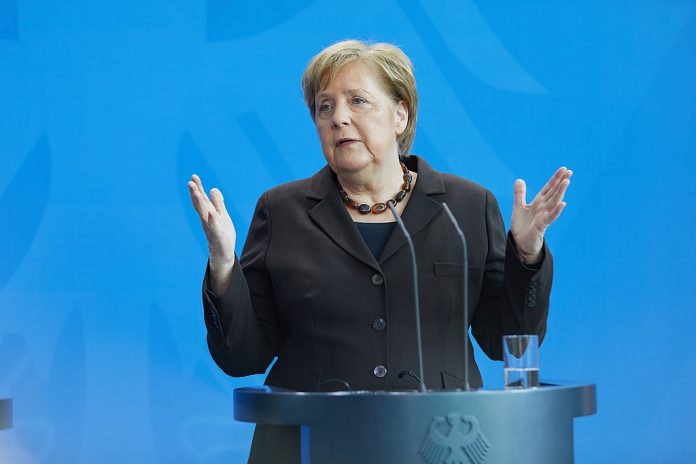Germany’s Economy Minister Peter Altmaier confirmed last week what many pundits suspected: German officials still firmly believe Beijing will make progressive reforms if Europe and China continue their close trading relationship – a theory known as Wandel durch Handel, or “change through trade”. As Altmaier commented: “I have always been convinced and I still believe that change can be achieved through trade.”
This is likely the reason for Berlin’s enduring insistence on maintaining close dialogue with Beijing and not punishing it over human rights violations and breaks of international law – in contrast to a harder line taken by many of its European neighbors in recent weeks. But, as the Financial Times noted earlier this month regarding Chancellor Angela Merkel’s flimsy response to Beijing’s imposition of direct rule over once politically autonomous Hong Kong, “China hawks from across the German political spectrum said that instead of stressing the need for co-operation, should have condemned Beijing outright over the law.”
If there’s one question dividing Europe’s China “hawks” and “doves” right now, it’s whether member states and the European Union should continue with their policy of “change through trade” that has produced almost no positive reform in China (the opposite, in fact) or shift strategy towards something more realistic, perhaps “change through sanctions.” Put differently, whether to swap the carrot for the stick.
“In 2020… the ‘change through trade’ argument has truly run its course and should be replaced with a more realistic approach,” Andreas Fulda, Senior Fellow at the University of Nottingham Asia Research Institute, put it in an essay in June.
When China joined the World Trade Organization in 2001, its trade in goods with the EU was worth just €113 billion. At the time, pundits spoke with some confidence the symbiosis of the U.S. and China (or “Chimerica”) was unbreakable and the Asian giant’s rise would most probably be peaceful. Beijing was still abiding by Deng Xiaoping’s instruction: “Hide your strength, bide your time, never take the lead.”
Now, 19 years on and with EU-China trade worth €560 billion, China’s rise has blatantly not been peaceful. President Xi Jinping has amassed far more power than any Chinese leader since Chairman Mao, while Donald Trump is rushing ahead this month with “de-coupling”.
In the last few months alone, Beijing has orchestrated the first deadly clash on the China-India border in four decades; imposed direct rule over the politically-autonomous Hong Kong, in defiance of international treaty a European country was supposed to uphold; and occupied disputed territory in the South China Sea, also in violation of international law.
As well, it has instigated at least extreme human rights violations (though most probably a genocide) in Xinjiang province against Muslim minorities, including the Uighur population. One should also note Beijing’s numerous crimes and human rights violations against its own people for decades, as well as its incompetency and lies that allowed a coronavirus epidemic in one province to become a global pandemic.
But even if one was to grant the German government some leeway and allow that “change through trade” might be possible with China; what time frame are they going to give this process? Historians tend to be too patient for social change and social scientists overly impatient. Yet, should we assume that Wandel durch Handel is a good option if Beijing doesn’t start to engage in political reforms towards democracy or economic reform towards open market access for foreign firms until 2030 or 2050, or even not until the end of the century?
This isn’t to say that “change through change” is a useless concept; only it isn’t applicable for Europe’s dealings with China. It is applicable, however, for dealings with Vietnam – another repressive, Communist Party-run state. When the EU finally agreed to a free-trade deal with Vietnam in February, which is expected to boost Vietnamese exports to the bloc by 42.7 percent by 2025, it came with strings attached.
One condition was that Hanoi had to allow independent trade unions to operate, when previously the only legal unions were those affiliated with the party-apparatus. Vietnam’s National Assembly voted through legislation for this change in November. Recent reports suggest Vietnam is also reforming its prison system because of the European trade pact, which also comes with conditions on contract dispute resolutions, which should improve Vietnam’s courts.
In the long-run, these reforms are likely to weaken the authoritarian control of the Communist Party, the reason why Hanoi hadn’t introduced the reforms before the trade pact. Why would Hanoi ascribe to this? Because Vietnam is desperate for European trade and investment. But China isn’t.
As such, when practicing “change through trade” the party trying to enforce the change actually needs some leverage, while the party that enacts the change must be desperate for trade. Put differently, there needs to be an unequal power structure. When it comes to China, Europe is not the more powerful actor, however.
Then, Berlin’s insistence on “change through trade” reveals a certain arrogance and cynicism. Berlin must believe that German trade to China is so important that it can entice Beijing to fundamentally change its economic and political structures in ways that would imperil the ruling Chinese Communist Party. Yet, at the same time, reckon that Germany lacks the leverage to force reform in China through sanctions and punitive measures.
Writing last year, Noah Barkin, a senior visiting fellow at the German Marshall Fund, asserted that “with nothing to replace ‘Wandel durch Handel,’ Germany finds itself in a strategic gray zone with China, aware that its largest trading partner is evolving into a bigger and brasher threat, but unwilling to test the relationship in any serious way.” But at least admitting one’s mistaken thought process would be the first step.
The views and opinions expressed in this article are those of the author.

David Hutt is a political journalist based between the Czech Republic and UK, covering Europe-Asia relations and Central European politics. He is contributing editor at The Geopolitics. He is also a columnist at the Diplomat and Asia Times, and a regular contributor to Foreign Policy, Nikkei Asian Review, Euronews, and others.


